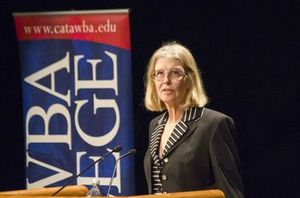
Author Jane Smiley delivered the keynote address at Catawba College’s 30th annual Brady Author’s Symposium on Thursday, March 17, 2016 in the Robertson College-Community Center on campus. Smiley is the author of numerous novels, including “A Thousand Acres” (1991), a story that is loosely based on Williams Shakespeare’s “King Lear” and was awarded the Pulitzer Prize for Fiction in 1992. Most recently, she completed the final volume, “Golden Age,” of the three-volume The Last Hundred Years trilogy.
Here are some comments Smiley shared during her visit:
“When I began The Last Hundred Years trilogy, I might have called it A History of Weather on the Farm…. I wanted to depict the interface between weather and farming.”
“Some of the most sinister changes in the last 100 years have been in farming.”
“Without farming, I would have nothing to wear, nothing to eat, and nothing to feed my horses.”
“I grew up in St. Louis, but I didn’t like living in town. I was always interested in the landscape.”
“Ames [Iowa] was where I saw the world in a new light and I got much more interested in writing about the world and not just families.”
“I loved to read as a kid – horse books, the Bobbsey Twins and Nancy Drew.”
“Every novel is inherently political.”
On why her novel “A Thousand Acres” was a twist on Shakespeare’s “King Lear”: I thought that the girls [Lear’s daughters, Goneril and Regan] didn’t say their point of view. I was somewhat offended by this old guy who kept yammering on.”
On what is her writing habit: “My habit is unbreakable.”
“Put your [writing] investment in the bent of production. The farther away you are from the center of the club, the better off you are.”
On her technique for teaching writing: “I want them to understand it’s about play, it’s about fiddling with it. I want them to understand that originality is a gift.”
“If something is a pleasure after you do it, you feel good. If it’s an addiction, after you do it you feel bad, so for me, writing is a pleasure. I enjoy it. I enjoy the process – it’s like play.”
On where she finds an idea for a novel: “It can come from anything, you just have to be curious.”
“If I’m stuck in my work, I’ll go to the barn. It’s another part of my life that feeds into my work.”
